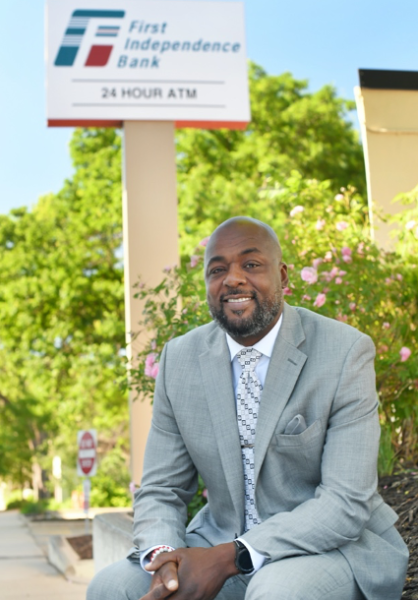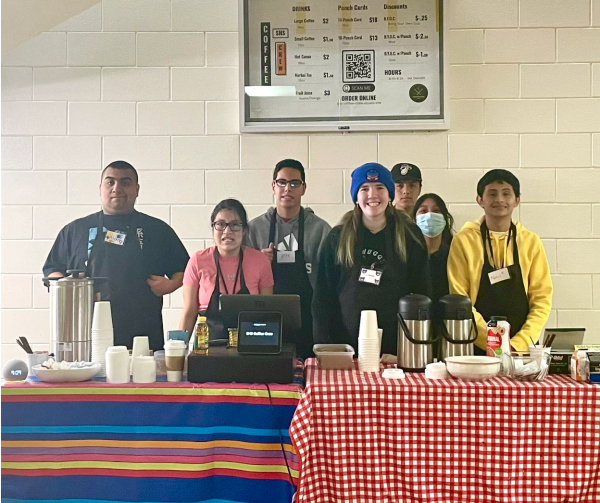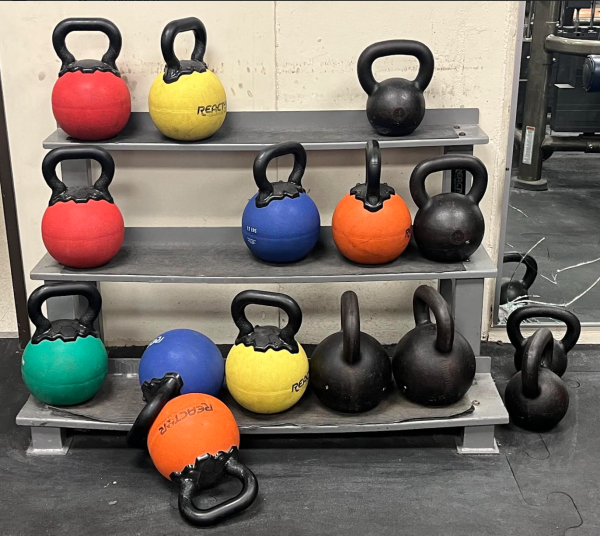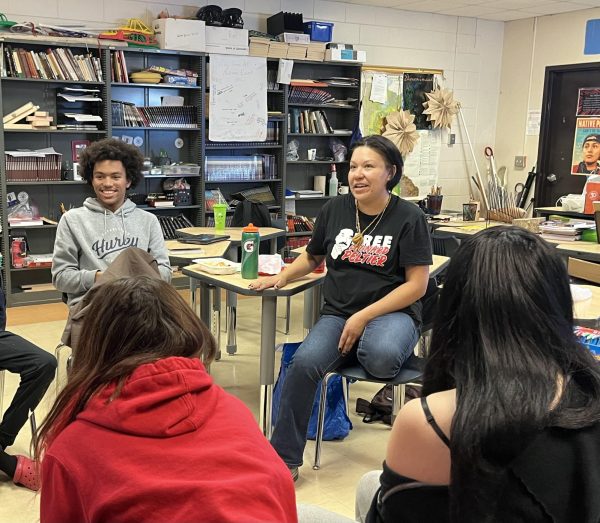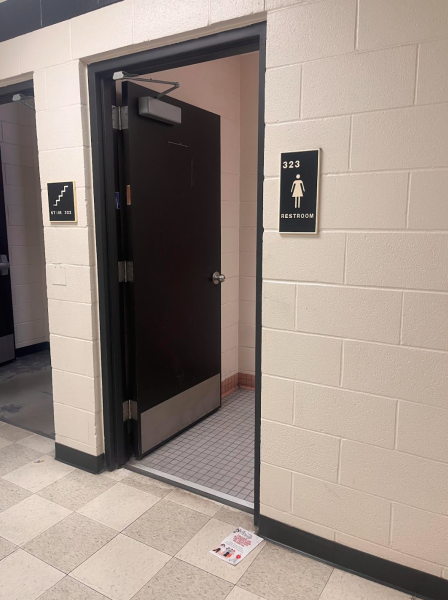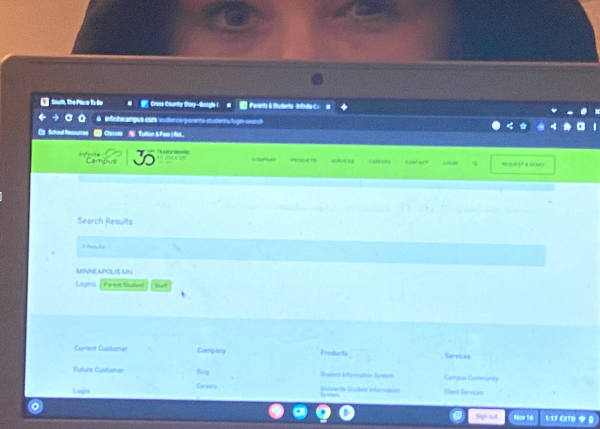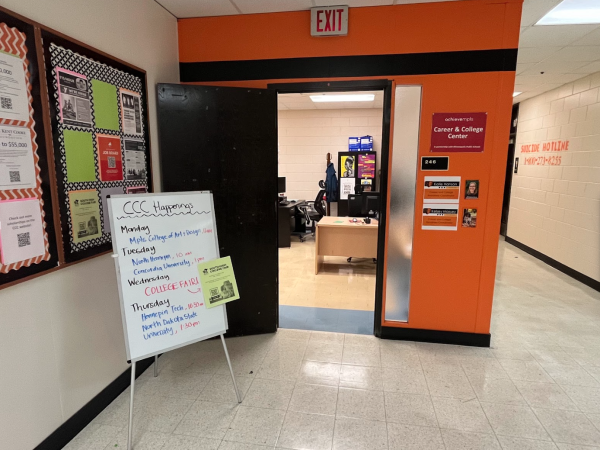Q&A with Jesse Hagopian: Speaking out against high stakes testing
The South High Southerner recently got the chance to talk to anti-standardized testing leader Jesse Hagopian. Hagopian visited the Twin Cities to speak at Macalester College, but also stopped by South High’s own auditorium to speak at a student assembly. After, the Southerner asked him a few questions. To learn more about Hagopian’s role in the opt-out movement, find his recent book, “More Than a Score: The New Uprising Against Standardized Testing.”
SHS: [At South, it seems like] more privileged kids are the one’s who are opting out – so is that seen as a broader act of defiance or is it less valid? And is that being seen universally or is it more of a unique problem that we’re having?
JH: I do think that if you look at the numbers of who is opting the kids out right now it is disproportionately white and I would venture to guess disproportionately families that have more resources, because they have access to information about what’s going on. But, that being said I think that actually it’s low income communities and black families and other people of color that are being most impacted by these tests.
Like, in Chicago they closed 50 schools. In one year, 50 schools. And how to they decide these schools? Well, it’s the failing schools, right? So instead of bringing of bringing them the resources that they need to succeed – lowering the class sizes, the wrap-around services, the tutors, they just shut them down. And it’s almost always in the Black neighborhoods. That’s why schools there have risen up to fight back and I think you’re increasingly seeing people of color taking the lead in this fight as they have for a long time.
That’s why uncovering the history of the first test resistors is so important. It was a whole cadre of Black intellectuals who were the first people to really organize and fight back against standardized testing. The tests are measuring your access to resources, not your knowledge. and [they’re] saying this back in 1940.
I think this movement would do well to not just be an individual movement… but to figure out how do we bring communities together to collectively struggle. It does need to grow and become more diverse than it is right now and I think that one of the best ways to do that is to connect it to the Black Lives Matter movement and reveal the racist origins of high stake testing, to show that these tests are disproportionately targeting people of color, and to define the Black Lives Matter movement beyond just we don’t want to shot down in the street with unaccountable police, but we want an education system that teaches people about Black history.
SHS: You were talking about this individual effort – at what point do you think it changes from these isolated occurrences to a movement? And what can students do to help legitimize or increase this into a movement?
JH: I think that we’re actually in the largest uprising against high stakes testing in U.S. History… I think we’ve reached the point where we’re seeing more collective action, where national leaders are being formed in this movement and they’re actually talking.
I think it’s moving in that direction, the quicker and more people join it the sooner we’ll get rid of these tests. It’s not going to be easy. The richest people in the world… have decided they’re going to use their money to reduce education to a test score. So we’re up against the wealthiest people that have ever lived in the history of humanity, who have decided that critical thinking should be eliminated. That’s not going to be an easy fight. They have a lot of influence in the media and to politicians… But civil rights movements have surprised people in the past. Slavery was supposed to last forever, but people organized and fought back. Segregation was just natural and was going to last forever, but people organized and fought back. I think the same dynamic can happen here if we get enough people organized.
See thats the– you should share that, if you guys should organize a forum on this, you guys could talk about that, other students talk about other problems with the test, that’d powerful.
SHS: So how important do you believe being globally competitive is, and is it important to cater to the way society functions today? Do you think that opting out of standardized testing is part of this larger grassroots shift in an effort to change society’s values overall?
JH: I think we need to get away from global competition. I think we need to think about global collaboration. What is global competition getting us? We have the worst inequality. For those 85 people who have as much wealth as 3.5 billion people, global competition is working just fine for the 1%. Global competition isn’t working well for the 99% of people that live on the planet, regardless of what country you’re in. Global competition is giving us endless wars. We’re just bombing the Middle East probably throughout your entire lives, we have been spending trillions of dollars to destroy and just lay waste to the Middle East so that we can capture oil resources and oil markets to outcompete them globally.
Global competition is such a destructive force, and yet thats what they say the purpose of public education is for, and if thats the purpose, then we need a new education system thats about global collaboration. Building solidarity across borders, so that people of all countries that aren’t benefitting from these wars and this inequality can work together to redefine our society so that its meeting human need.
SHS: With our government that values global competition do you think its possible or effective for top-down governmental change with the movement, or will it have to be solely a grassroots movement?
JH: I think that, in my study of history, all the important changes that have come about, that have improved the vast majority of people’s lives have been bottom-up, grassroots campaigns that have fought back and transformed the government. Frederick Douglass said it, a great abolitionist, an escaped slave, “Power concedes nothing without a demand, it never has and it never will,” and I don’t think he’s been proven wrong yet. I think [the opt-out movement] is going to be the same way.
This is a global struggle, by the 1% who want to eliminate critical thinking because its a good way to maintain inequality. How do you maintain 85 people having that much wealth? It doesn’t just happen naturally, you have to work really hard… You really want to eliminate the ability to criticize or think deeply about these policies that are happening, and eliminating critical thinking is an important way to maintain inequality in our society.
SHS: You talked about a couple examples, but… what do you think the most effective place for dissent to come from is, and what would be the best way for students to support teachers who refuse to administer the test, since there is such danger to teachers, how can students be involved in that?
JH: Students taking the lead can be some of the most effective ways to challenge these tests… At Garfield, we refused to give the test but they would’ve found a way around our boycott if the students hadn’t staged the sit-in and refused to go take it, and that is what ultimately made our movement successful.
Throughout U.S history, student led movements have transformed our society… Students have a lot of power that they can use, and I think besides the students standing up for their own rights in education.
SHS: How do you believe teachers should be evaluated? Standardized and high stakes testing [might not] work, but is there a better way to evaluate teachers that can ensure some level of quality?
JH: The first thing I think we need to do is apply the same scrutiny that the conversation is around now on teachers, and apply it to politicians. We should have very rigid [way] of measuring their success, and if they don’t make it, then they should be fired. We need to turn it around and put it on them. ‘Are you funding our schools properly? No? You’re fired.’
So if you go and you look at a country like Finland that often scores #1 on the list, how do they do teacher evaluation? What they do there is that they make teaching a very sought-after position, and its prestigious, and it usually takes quite a bit of schooling to become a teacher… You have to go through a lot of schooling, and then they trust you as a professional. What they do is they flood the schools with support. You have counseling staff there who help kids who have problems, wrap-around services, healthcare, afterschool tutors. You bring all these resources to the schools to set up the teachers for success… Sometimes teachers get burnt out because of all the stress and the unworkable situation thats been set up in the public schools. We need to move away from this culture of hyperaccountability of teachers and move toward giving our schools the resources they need, and teachers the space they need to teach.
SHS: What effect do you think standardized testing has on the [opportunity] gap?
JH: I think schools should be about is teaching people how to collaborate and work together. If you wanna judge teachers, judge us on our ability to build collaborative classrooms, right, not on our ability to train you like you’re animals to do little circus tricks.Oh look, this student can now eliminate more wrong answer choices than this other student. But where does that leave us in a society this deeply unequal?
The problem is really with politicians and the unequal distribution of resources that isn’t supporting every kid and not giving them the opportunity.

